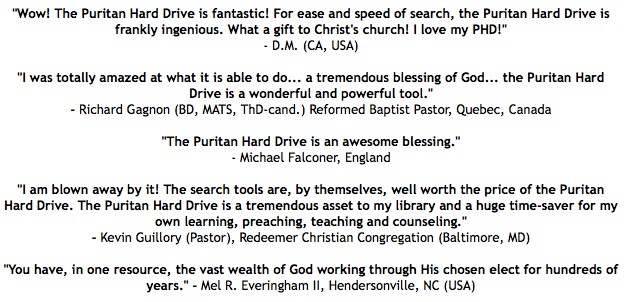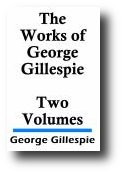 Loading... Please wait...
Loading... Please wait...- SWRB Home
-
Free Resources
- Short Listings Of Free Reformation & Creation Resources
- Free Reformed, Puritan, Covenanter and Creationist Videos
- Thousands of Links to Free Audio, Video and Printed Resources
- Free Puritan Books, Reformed MP3s, and Calvinist Videos
- Puritan Quotes, Free Reformation MP3s, Reformed Books and Calvinist Videos From PuritanDownloads.com On FaceBook
- Shipping & Returns
- Blog
- Privacy Policy
- Contact Us
- Payment Options
- Help
-
About Us
- Sitemap
Pastor Scott Brown, on the left in the video above, is the Director of the National Center for Family-Integrated Churches (NCFIC)
Resource Categories
- PURITAN HARD DRIVE REVIEWS
- PASTOR ROB VENTURA ON THE PURITAN HARD DRIVE
- DR. VODDIE BAUCHAM, JR. ON THE PURITAN HARD DRIVE
- R. C. SPROUL ON SWRB
- DR. JOEL R. BEEKE ON THE PURITAN HARD DRIVE
- PASTOR GREG L. PRICE ON THE PURITAN HARD DRIVE
- DR. MATTHEW MCMAHON ON THE PURITAN HARD DRIVE
- PASTOR SCOTT BROWN ON THE PURITAN HARD DRIVE
- PASTOR W. J. MENCAROW ON THE PURITAN HARD DRIVE
- JOAQUIN FERNANDEZ ON THE PURITAN HARD DRIVE
- PASTOR DAVID SILVERSIDES ON THE PURITAN HARD DRIVE
- JOHN HENDRYX ON THE PURITAN HARD DRIVE
- PASTOR KEVIN GUILLORY ON THE PURITAN HARD DRIVE
- RICHARD BENNETT ON THE PURITAN HARD DRIVE
- DR. KENNY RHODES ON THE PURITAN HARD DRIVE
- JUSTIN RAWSON ON THE PURITAN HARD DRIVE
- PASTOR JAMES WALLACE ON THE PURITAN HARD DRIVE
- PASTOR RICHARD GAGNON ON THE PURITAN HARD DRIVE
- PASTOR JOE HAYNES ON THE PURITAN HARD DRIVE
- DR. STEVEN DILDAY ON THE PURITAN HARD DRIVE
- PASTOR ANDREW COMPTON ON THE PURITAN HARD DRIVE
- TERENCE ELLARD ON THE PURITAN HARD DRIVE
- PASTOR JERRY JOHNSON ON THE PURITAN HARD DRIVE
- PASTOR DAVID PETRIE ON THE PURITAN HARD DRIVE
- JIM DODSON ON THE PURITAN HARD DRIVE
- PASTOR BRIAN SCHWERTLEY ON THE PURITAN HARD DRIVE
- PASTOR PHIL GIBSON ON THE PURITAN HARD DRIVE
- MEL R. EVERINGHAM II ON THE PURITAN HARD DRIVE
- PAUL BLYTH ON THE PURITAN HARD DRIVE
- STEVE KETTLER ON THE PURITAN HARD DRIVE
- D. M. (CALIFORNIA) ON THE PURITAN HARD DRIVE
- MICHAEL CAUGHRAN ON THE PURITAN HARD DRIVE
- WIILIAM NOPPER IV ON THE PURITAN HARD DRIVE
- LINDA THERIAULT ON THE PURITAN HARD DRIVE
- WILLIAM WARNOCK ON THE PURITAN HARD DRIVE
- ROBERT KOH ON THE PURITAN HARD DRIVE
- WHAT'S ON THE PURITAN HARD DRIVE?
- ALL PURITAN HARD DRIVE VIDEOS
- PHD-ODE INSTALLATION VIDEOS
- COMMENTS ON SWRB
- ALL PURITAN QUOTE VIDEOS
- PURITAN HARD DRIVE SCREENSHOTS
- PURITAN HARD DRIVE MINISTRY AND DONATION OFFERS
- TABLE OF RESOURCE CATEGORIES
- Advanced Studies
- SWRB SERMONAUDIO MOBILE APP
- Apologetics
- Assurance
- Attributes and Holiness of God
- Augustine
- Banner of Truth
- Baptism
- Beginners
- Bibles (Geneva, KJV, Hexapla, etc.)
- Biblical Counseling
- BIBLICAL HD COLLECTION
- Biblical Interpretation (Hermeneutics)
- Biographies and Autobiographies
- Calvinism and the Sovereignty of God
- CALVINISM HD COLLECTION
- CALVINIST CLASSICS HD COLLECTION
- Charles Spurgeon
- Children's Books
- CHRISTIAN EDUCATION HD COLLECTION
- Christian History
- Church Government
- Civil Government and Resistance
- CLASSIC CHRISTIAN HD COLLECTION
- Classic Puritan and Reformed Sets
- Commentaries
- Contemporary Issues
- Covenant Theology and Covenanting
- COVENANTER HD COLLECTION
- Covenanters and Covenanted Reformation
- Creation and Creationism
- Creeds, Confessions and Covenants
- Cults, False Religions, Psychology, Humanism
- Dealing with Affliction, Suffering, and Sickness
- Debates
- Dutch Reformed
- Education and Home Schooling
- English Puritans, Covenanters and Reformers
- Family, Children, Home, and Family Worship
- First Reformation
- Five Points of Calvinism (TULIP)
- For Pastors and Elders
- For Seminary Students
- FREE PURITAN & REFORMATION MP3 AUDIO SERMONS/BOOKS
- FREE PURITAN BOOKS, REFORMATION MP3s, PDFs, VIDEOs
- George Gillespie
- God's Law, The Ten Commandments, etc.
- Greg L. Price on Headcoverings
- Heaven, Hell and the Final Judgment
- Holy Days (Lord's Day, Christmas, Easter, etc.)
- HOME SCHOOL HD COLLECTION
- Intermediate Studies
- John Bunyan
- John Calvin
- John Knox
- John Owen
- Jonathan Edwards
- Justification
- Languages, Dictionaries, Reference, etc.
- LOOK WHO LOVES THE PURITAN HARD DRIVE
- Lord's Supper (Communion)
- Marriage, Courtship, etc.
- Martin Luther and Lutheranism
- Martyrs and Persecution
- Other Protestant Works
- Predestination and Providence
- PRESBYTERIAN HD COLLECTION
- Presbyterians and Presbyterianism
- Prophecy, Antichrist, and Eschatology
- PROTESTANT HD COLLECTION
- PSALM SINGING MP3s (COMPLETE SET)
- Psalters, Psalm Singing and Music
- Puritan Facts
- PURITAN FAST SERMONS (1640-1653) - 34 VOLS SET
- Puritan Fast Sermons 1640-1653
- PURITAN HARD DRIVE
- Puritans and Puritanism
- REFORMATION HD COLLECTION
- Reformation History
- Reformed and Puritan Classics
- Reformed Baptist
- REFORMED BAPTIST HD COLLECTION
- REFORMED HD COLLECTION
- REFORMED PRESBYTERIAN HD COLLECTION
- Reformed Presbytery, RPNA Protesters, etc.
- Reformed Theology
- Reformed Worship, The Regulative Principle, etc.
- Roman Catholicism, the Jesuits, Islam, etc.
- Salvation and Evangelism
- Samuel Rutherford
- Sanctification, Prayer and Holiness
- Scottish Covenanters
- Scottish Presbyterianism
- Scripture Song MP3s (Psalms and Bibles Verses)
- Second Reformation
- Separation, Unity, Uniformity, etc.
- Sermons and Sermon Collections
- Solemn League and Covenant
- Theology and Doctrine
- Third Reformation
- Thomas Watson
- Westminster Confession, Assembly and Divines
- Authors (All A to Z)
Phone Orders:
(780) 450-3730
To obtain free Reformation books, Puritan MP3s and Calvinistic videos, SWRB discount coupons, etc., add yourself to SWRB's Puritan and Reformed email list by using the form above.
The Works of George Gillespie 2 Volume Set
Resource Details
Resource Description
Gillespie was one of the Scottish commissioners to the Westminster Assembly. He was one of the greatest theologians of all time -- almost singlehandedly steering this august Assembly at certain points. As Hetherington notes, "in all those debates no person took a more active part, or gained more distinction than George Gillespie," though he was the youngest man there. Furthermore, Hetherington calls him a "genius of the highest order," and writes that his work "dazzled and astonished his countrymen." He "held an undisputed position among the foremost of the distinguished men by whose talents and energy the Church of Scotland was delivered from the prelatic despotism" of that day.
This rare work contains Gillespie's personal notes during the Westminster Assembly and A Dispute Against English Popish Ceremonies. A Dispute Against English Popish Ceremonies is a rare classic on Reformed worship, taking on all the arguments related to the use of man-made ceremonies in worship. Burned by the Prelates (Episcopalians) just after it first appeared in 1637, this masterful defense of the regulative principle has yet to be answered (by those that oppose God's sovereignty in worship). It ably, and in a detailed manner, refutes the old errors of Prelacy and Romanism in worship -- many of which are being resurrected in our day by writers like James Jordan, Steve Schlissel and John Frame (and others abandoning historic Presbyterian [i.e. Biblical] worship).
Gillespie's practical "Treatise of Miscellany Questions," contains 22 chapters. Topics dealt with range from: whether prophets and prophesying continued beyond the primitive church (which Gillespie answers in the affirmative); whether a sound heart and an unsound head can consist together; what are heresies and what is their purpose; are infants to be baptized; should the civil government attach a negative sanction to not swearing to the Solemn League and Covenant (against one aspect of Theonomy); etc. These Works also contains a memoir of Gillespie's life and writings, written by Hetherington, Gillespie's sermons before the house of commons, and much more!
Contains the following works by George Gillespie:
- "A Dispute Against English Popish Ceremonies, 1637"
- "111 Propositions Concerning the Ministry and Government of the Church, 1644"
- two of Gillespie's sermons, preached before the House of Common (1644), and the House of Lords (1645)
- George Gillespie's answers to Coleman which defends Presbyterian polity against Erastianism
The table of contents from George Gillespie's Dispute Against The English Popish Ceremonies Obtruded On The Church Of Scotland follows:
- Dedication
- Author's Preface
- Prologue.
Order.
The First Part. Against The Necessity Of The Ceremonies.
- Chapter I. That Our Opposites Do Urge The Ceremonies As Things Necessary
- Chapter II. The Reason Taken Out Of Acts XV. To Prove The Necessity Of The Ceremonies, Because Of The Church's Appointment, Confuted
- Chapter III. That The Ceremonies Thus Imposed And Urged As Things Necessary, Do Bereave Us Of Our Christian Liberty, First, Because Our Practice Is Adstricted
- Chapter IV. That The Ceremonies Take Away Our Christian Liberty Proved By A Second Reason, Namely, Because Conscience Itself Is Bound And Adstricted
- Chapter V. That The Ceremonies Take Away Christian Liberty, Proved By A Third Reason, Viz., Because They Are Urged Upon Such As, In Their Consciences, Do Condemn Them
- Chapter VI. That The Ceremonies Take Away Christian Liberty Proved By A Fourth Reason, Viz., Because They Are Pressed Upon Us By Naked Will And Authority, Without Giving Any Reason To Satisfy Our Consciences
- Chapter VII. That Festival Days Take Away Our Liberty, Which God Hath Given Us, Proved; And First Out Of The Law
- Chapter VIII. That Festival Days Take Away Our Christian Liberty, Proved Out Of The Gospel
- Chapter IX. Showing The Weakness Of Some Pretences Which Our Opposites Use For Holidays
The Second Part. Against The Expediency Of The Ceremonies.
- Chapter I. Against Some Of Our Opposites, Who Acknowledge The Inconveniency Of The Ceremonies, And Yet Would Have Us Yield To Them
- Chapter II. Against Those Of Our Opposites Who Plead For The Ceremonies As Things Expedient
- Chapter III. That The Ceremonies Are Inexpedient, Because They Are Preparatives For Greater Evils
- Chapter IV. That The Ceremonies Are Inexpedient, Because They Hinder Edification
- Chapter V. That The Ceremonies Are Inexpedient, Because They Are Occasions Of Injury And Cruelty
- Chapter VI. That The Ceremonies Are Inexpedient, Because They Harden And Confirm The Papists
- Chapter VII. That The Ceremonies Are Inexpedient, Because They Disturb The Peace Of The Church
- Chapter VIII. That The Inexpediency Of The Ceremonies, In Respect Of The Scandal Of The Weak, May Be Plainly Perceived. Twelve Propositions Touching Scandal Are Premitted
- Chapter IX. All The Defences Of The Ceremonies, Used To Justify Them Against The Scandal Imputed To Them, Are Confuted
The Third Part. Against The Lawfulness Of The Ceremonies.
- Chapter I. That The Ceremonies Are Unlawful, Because Superstitious, Which Is Particularly Instanced In Holidays, And Ministering The Sacraments In Private Places
- Chapter II. That The Ceremonies Are Unlawful Because They Are Monuments Of By-Past Idolatry, Which Not Being Necessary To Be Retained, Should Be Utterly Abolished, Because Of Their Idolatrous Abuses: All Which Is Particularly Made Good Of Kneeling
- Chapter III. That The Ceremonies Are Unlawful, Because They Sort Us With Idolaters, Being The Badges Of Present Idolatry Among The Papists
- Chapter IV. That The Ceremonies Are Idols Among The Formalists Themselves; And That Kneeling In The Lord's Supper Before The Bread And Wine, In The Act Of Receiving Them, Is Formally Idolatry
- Chapter V. The Fifth Argument Against The Lawfulness Of The Ceremonies Taken From The Mystical And Significant Nature Of Them
- Chapter VI. That The Lawfulness Of The Ceremonies Is Falsely Grounded Upon The Holy Scripture; Where Such Places As Are Alleged By Our Opposites, Either For All The Ceremonies In General, Or For Any One Of Them In Particular, Are Vindicated From Them
- Chapter VII. That The Lawfulness Of The Ceremonies Cannot Be Warranted By Any Ecclesiastical Law, Nor By Any Power Which The Church Hath To Put Order To Things Belonging To Divine Worship
- Chapter VIII. That The Lawfulness Of The Ceremonies Cannot Be Warranted By Any Ordinance Of The Civil Magistrate; Whose Power In Things Spiritual Or Ecclesiastical Is Explained
- Digression I. Of The Vocation Of Men Of Ecclesiastical Order
- Digression II. Of The Convocation And Moderation Of Synods
- Digression III. Of The Judging Of Controversies And Questions Of Faith
- Digression IV. Of The Power Of The Keys, And Ecclesiastical Censures
- Chapter IX. That The Lawfulness Of The Ceremonies Cannot Be Warranted By The Law Of Nature.
The Fourth Part. Against The Indifferency Of The Ceremonies.
- Chapter I. Of Our Opposites' Pleading For The Indifferency Of The Ceremonies
- Chapter II. Of The Nature Of Things Indifferent
- Chapter III. Whether There Be Anything Indifferent In Actu Exercito
- Chapter IV. Of The Rule By Which We Are To Measure And Try What Things Are Indifferent
- Chapter V. The First Position Which We Build Upon The Ground Confirmed In The Former Chapter
- Chapter VI. Another Position Built Upon The Same Ground
- Chapter VII. Other Positions Built Upon The Former Ground
- Chapter VIII. That The Ceremonies Are Not Things Indifferent To The Church Of Scotland; Because She Did Abjure And Repudiate Them By A Most Solemn And General Oath
- Chapter IX. A Recapitulation Of Sundry Other Reasons Against The Indifferency Of The Ceremonies
Volume 2
Contains George Gillespie's "A Treatise of Miscellany Questions;" "Notes of Debates and Proceedings of the Assembly of Divines at Westminster (February 1644 to January 1645)" and more.
A section from volume two of The Works of George Gillespie is entitled, "Whether it be lawful, just, and expedient, that the taking of the Solemn League and Covenant be enjoined by the Parliament upon all persons in the kingdom under a considerable penalty."
This is chapter 16 of "A Treatise of Miscellany Questions," pp. 85-88, and gives important insights in Second Reformation thought among the Covenanters who attended the Westminster Assembly.
All resources for sale on this website, with the exception of Scottish Metrical Psalms MP3s, are available on the Puritan Hard Drive .
VIDEO INTRODUCTION TO THE PURITAN HARD DRIVE


Find Similar Resources by Category
Phone Orders:
(780) 450-3730
To obtain free Reformation books, Puritan MP3s and Calvinistic videos, SWRB discount coupons, etc., add yourself to SWRB's Puritan and Reformed email list by using the form above.








































